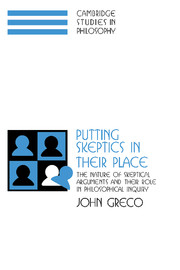 Putting Skeptics in their Place
Putting Skeptics in their Place Book contents
- Frontmatter
- Contents
- Preface
- 1 The Nature of Skeptical Arguments and Their Role in Philosophical Inquiry
- 2 Skepticism about the World: Part One – Reconstructions
- 3 Skepticism about the World: Part Two – Dismissive Responses
- 4 Skepticism about the World: Part Three – Dualism, Realism, and Representationalism
- 5 The Argument from an Infinite Regress of Reasons
- 6 Hume's Skepticism about Unobserved Matters of Fact
- 7 Agent Reliabilism
- 8 Agent Reliabilism and the Relevant Sense of “Relevant Possibility”
- 9 Moral and Religious Epistemology
- Bibliography
- Index
8 - Agent Reliabilism and the Relevant Sense of “Relevant Possibility”
Published online by Cambridge University Press: 03 November 2009
- Frontmatter
- Contents
- Preface
- 1 The Nature of Skeptical Arguments and Their Role in Philosophical Inquiry
- 2 Skepticism about the World: Part One – Reconstructions
- 3 Skepticism about the World: Part Two – Dismissive Responses
- 4 Skepticism about the World: Part Three – Dualism, Realism, and Representationalism
- 5 The Argument from an Infinite Regress of Reasons
- 6 Hume's Skepticism about Unobserved Matters of Fact
- 7 Agent Reliabilism
- 8 Agent Reliabilism and the Relevant Sense of “Relevant Possibility”
- 9 Moral and Religious Epistemology
- Bibliography
- Index
Summary
Recall the skeptical argument (D3) from Chapter 2. The major premise of that argument was that good evidence must discriminate among alternative possibilities. In other words, my evidence for a belief p can give me knowledge only if it would cause me to believe that p is true in cases where p is true, and also would not cause me to believe that p is true in cases where p is false and some alternative is true. But, the argument continues, since sensory appearances do not discriminate in this way between what we believe and various skeptical scenarios, sensory evidence cannot give rise to knowledge of the material world.
I suggested that a solution to (D3) is to deny the assumption that evidence must rule out all alternative possibilities to generate knowledge. The idea was that evidence must discriminate among relevant possibilities, but not all possibilities are relevant. In particular the possibilities that I am a brain in a vat or the victim of an evil demon do not seem to be relevant ones. Of course if I were a brain in a vat or the victim of a deceiving demon, then I would not know what I think I do, but so long as these remain mere possibilities they fail to undermine my knowledge.
- Type
- Chapter
- Information
- Putting Skeptics in their PlaceThe Nature of Skeptical Arguments and their Role in Philosophical Inquiry, pp. 204 - 219Publisher: Cambridge University PressPrint publication year: 2000


